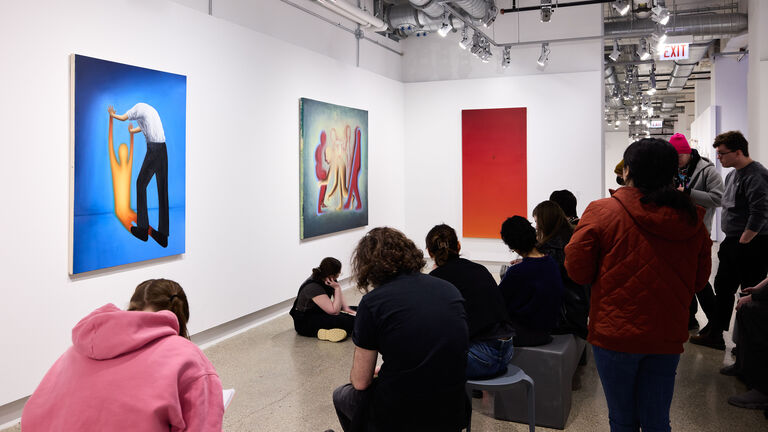
Photo by Tony Favarula; featuring artwork by Olivia Durham
Prospective International Students
Degree Programs
SAIC offers undergraduate bachelor's degrees, generally following high/secondary school; graduate master's degrees, advanced study generally following bachelor's degree programs; and post-baccalaureate certificates, advanced study generally following a bachelor's degree.
English for International Students (EIS)
Our English for International Students (EIS) courses serve to raise the English language proficiency of SAIC students whose native language is not English to an effective academic level at which they can successfully express complex thoughts when writing and effectively absorb abstract concepts from higher level textbooks.
Students whose TOEFL scores are below 96 IBT, 7.0 IELTS, or 65 PTE may be required to take English for International Students (EIS) fluency and critique classes before starting their other academic classes.
Classes are divided into the following categories:
- Fluency classes to improve your reading comprehension and academic writing skills.
- Critique classes to build your competence in giving critiques, participating in discussions, and giving presentations.
- Tutorials for ongoing support in language skills and fluency are available.
Low-Residence Master of Fine Arts Program
The Low-Res MFA works no differently for international students than it does for US residents with the exception of immigration and TOEFL requirements. International students can stay and study in the United States for the duration of the six-week residency only. Students will be permitted to enter the United States a few days before the residency begins and will be required to leave the United States a few days after the residency ends. It is important to note that international students in this program must remain outside of the US between each residency. Please note that according to US immigration regulations, international students enrolled in the Low-Res MFA program are not permitted to work off campus while in the United States.
High School Early College Program
Students of diverse backgrounds and experiences come to the Early College Program to strengthen their commitment to the study of art and design and develop a strong portfolio for college admission.
International Affairs recommends that students who plan to attend the Early College Program to contact the nearest US Embassy or Consulate to determine the required immigration documents needed to enter the United States. Locate your nearest Embassy or Consulate.
Continuing Studies
Continuing Studies at SAIC provides lifelong learning and the development of creative thought and practice in students of all ages. Non-degree classes are offered for children, middle school students, high school students, and adults. The Early College Program Summer Institute (ECPSI) is an intense and rigorous program specifically for high school students (ages 15–18) who are interested in strengthening their commitment to the study of art and design.
SAIC is only able to issue I-20s—also known as the Certificate of Eligibility for Non-immigrant (F-1) Student Status-For Academic and Language Students—to students who are accepted to a degree, post-baccalaureate certificate, or the Early College Program Summer Institute (ECPSI). SAIC is not permitted to issue immigration support documents for international students participating in the other Continuing Studies program/courses.
Financial Resources
Explore the range of resources offered below, and contact Student Financial Services at 312.629.6600 with questions.
-
SAIC's tuition is charged at a per-credit-hour rate. Graduate and undergraduate tuition and fees for each semester must be paid by the first day of classes for that semester. Extended payment plans can be arranged with the Student Financial Services office.
-
We recognize that the cost of a US education can be expensive. The best source for financial assistance for international students is often in their home country. Since the US government does not provide funding for foreign nationals to study in the United States, students should make every effort to identify potential funding sources (national, provincial, or private) in their home country. Most grants, scholarships, and loans from public and private sources in the United States are restricted to US citizens or permanent residents, limiting the amount of information international students can find about financial aid from US sources. Scholarships may be an option, and we suggest using the internet as a means to research them. Edupass.org presents considerable information about financial aid for international students.
SAIC staff members have researched and compiled a list of Funding and Financial Resources for which you may qualify. This information was gathered by conducting a scholarship search through one or more of the online scholarship search pages, as well as information received by SAIC from organizations offering scholarships. It is not limited to organizations through which SAIC students have received funding.
Students interested in applying for loans should first consider borrowing from a bank in their home country. Those planning to apply for loans in the United States will find that most loan agencies require a co-signer who is a US citizen or a permanent resident. Loan applications should be submitted to Student Financial Services with any and all necessary support documentation including a copy of the passport and immigration documents.